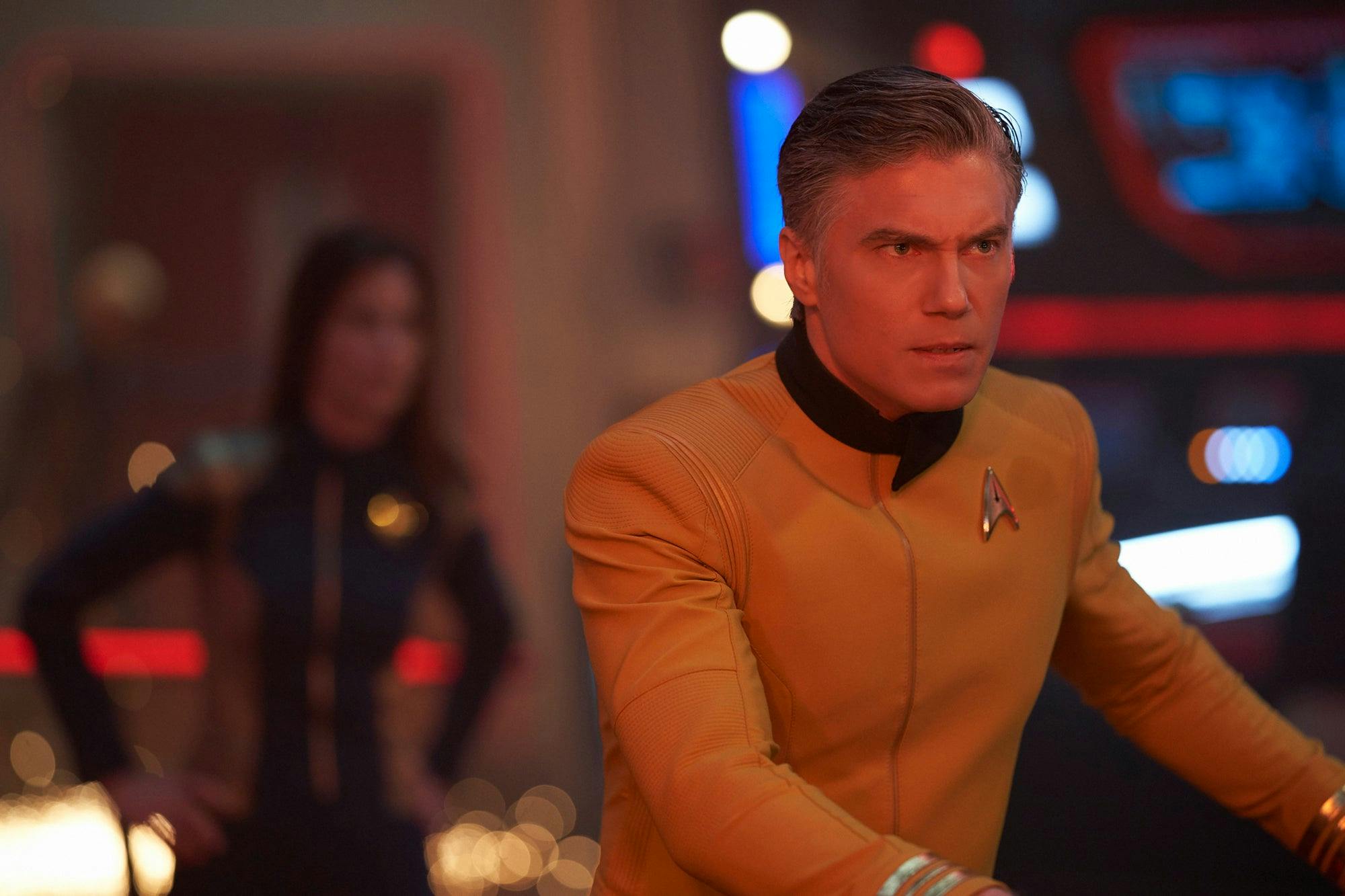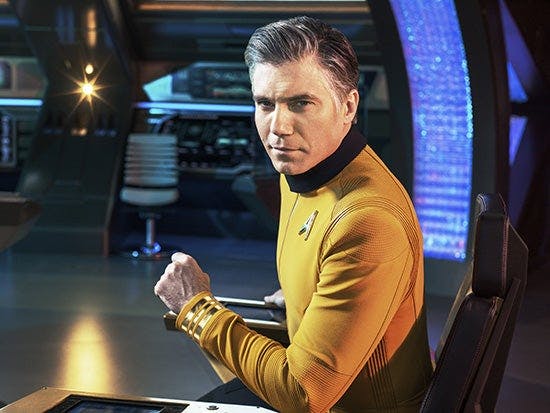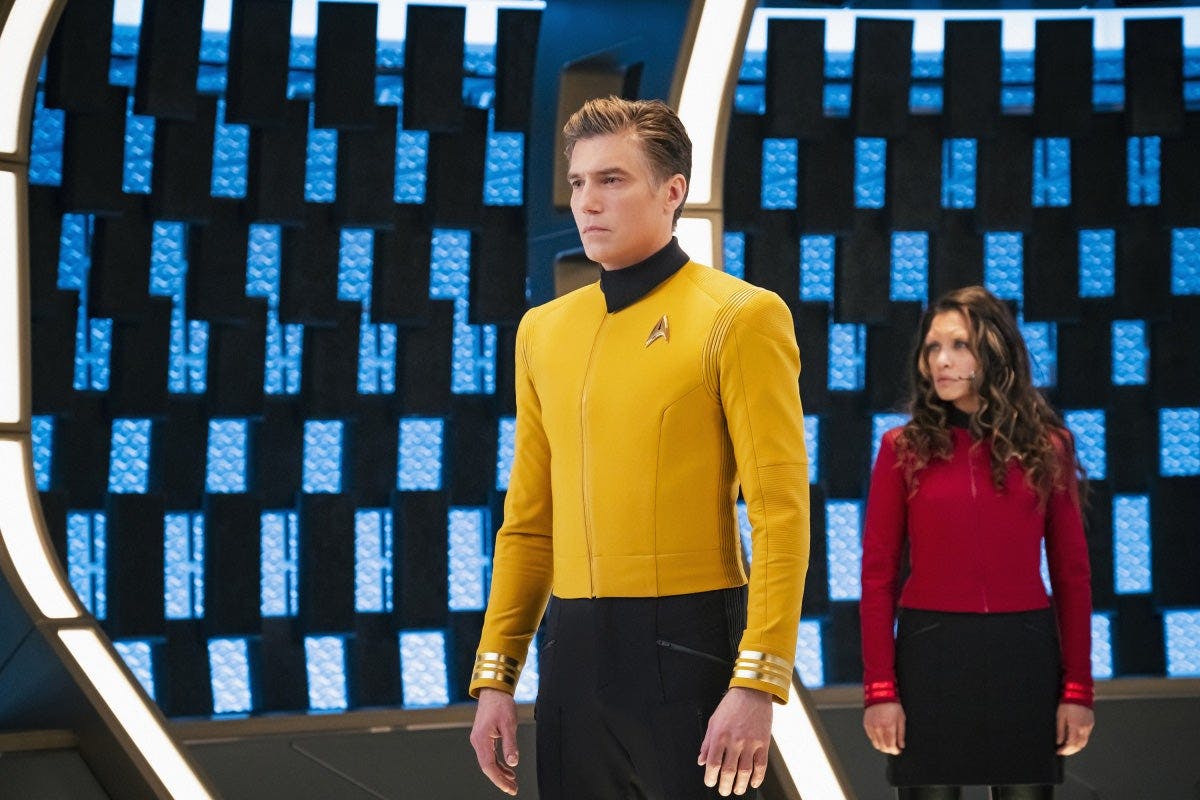Published Apr 28, 2022
Captain Pike Represents a Brighter Future
It turns out that the story of a good man is still one that's worth telling.

StarTrek.com
This article was first published in 2020.
When we first meet Captain Christopher Pike on Star Trek: Discovery, he looks like he’s straight out of Central Casting, a virtually perfect representation of what an ideal Starfleet officer should do and be. He’s handsome, charming, friendly and warm. He rocks some seriously great hair. It’s almost impossible not to like him immediately, particularly since he’s such a direct contrast to the controlling and ultimately evil Gabriel Lorca.
The thing is, though – Pike really is that man. It’s not an act or a false persona. He truly believes in the mission he serves and dedicates himself to living the ideals of Starfleet.
Honestly, he should be so irritating. Instead, Pike’s arrival is the best thing that could have possibly happened to Discovery’s second season, and his journey reminds us all why we love these stories in the first place.

Russ Martin / CBS Interactive
His character perfectly blends the nostalgia of classic Star Trek with more modern sensibilities, creating a leader that viewers want to root for. Sure, we knew who he was – and more importantly, what happened to him – prior to his appearance on Discovery, but aboard the ship, Pike finally becomes a fully rounded person. He is a man who doesn’t abuse his power over others. He values the opinions of those around him, no matter their rank or station. He tries to make up for his mistakes, and steadfastly works for the benefit of those in his command, rather than himself.
In short – Christopher Pike is a good man. That’s a rare thing in television, perhaps more so than ever these days. But it’s exactly what we as viewers – and Star Trek as a franchise at the moment – need more of.
In this era of peak TV, anti-heroes reign. Many modern television dramas center on the stories of good men or women who fall from grace. Others tell stories of bad men who become even worse versions of themselves, displaying little to no remorse over their previous actions. But whichever version of this story we see, the moral trajectory of these characters is always pretty much the same: Dark. A character like Pike, with his single-minded idealism and capable kindness, would probably find himself the butt of everyone’s jokes there.
Pike hails from an era that may seem somewhat removed from more modern takes on the Star Trek franchise, but his character remains an important symbol of the power inherent in it. If Trek is an optimistic reflection of our best selves as a society, then Pike’s character offers a similar take on what it means to be human. Flawed, to be sure, but decent and brave –the kind of everyday hero we could all hope to be in real life.
And that’s why Discovery needs this character so badly after its first season. He reminds us all that good people can make a difference, even in the face of seemingly terrible odds.
Goodness, after all, is not a character trait. It isn’t something you are; it’s something you do. It’s a choice, and it’s one that must be made repeatedly. That’s what makes it hard. It takes real work to be a decent person, and it’s an effort to choose to do the right thing simply for its own sake. (“Without hope, without witness, without reward,” as fellow sci-fi elder statesman, Doctor Who, once described it.)

StarTrek.com
Discovery deserves praise not just for making Pike such an unequivocally good guy, but for insisting that a story about a good man is still one that’s worth telling. Potentially a risky decision, given that mainstream entertainment appears to see characters who dedicate themselves to doing the right thing as bland ciphers. Here, however, it leads to one of the bravest decisions in Star Trek history. The Discovery crew needs a time crystal in order to save all sentient life in the galaxy. But in order to claim said crystal, Pike must face a terrifying vision of his own future. In it, he is horribly disfigured by radiation and forced to spend the rest of his life in unspeakable agony.
If Pike takes the crystal, that fate becomes irrevocable, and the events we see in The Original Series episode “The Menagerie” will come to pass. If he does not, he has a chance at a different life. For Pike, however, the choice is an obvious – if not necessarily easy – one.
“You're a Starfleet Captain,” he tells himself. “You believe in service, sacrifice, compassion, and love.”
When it matters most – alone in the dark, afraid and with full knowledge that he can never tell anyone what he’s done – Pike chooses to live the values he espouses. He doesn’t look for a way out or attempt to cheat the system. Instead, he faces a destiny he never asked for and gets on with it, all for the greater good.
Pike’s sacrifice doesn’t just take place on the planet Boreth, either. It’s an ongoing decision he must make every single day thereafter. Sure, Klingon Time Keeper Tenavik claimed that taking the crystal made his vision permanent, but how many of us would reject that assertion, and waste the rest of our lives trying to undo it?
Instead, Pike not only accepts his fate with grace, but he also allows it to propel him forward, using it as motivation for doing as much good as he can for as long as he can. It adds a bittersweet tinge to the fact that we know he has a decade of adventures left with Starfleet, and will be a dedicated, decorated officer right up until the end. He doesn’t shy away from what he knows is coming – just as we know he’ll save those cadets when the time comes, too. Every day, Pike chooses the path of light, of hope. He trusts that what he did was worth it – that it mattered – both then and now.

StarTrek.com
Star Trek itself has always been a franchise about hope. Discovery’s first season flirted with darker storytelling elements and characters, but with the season-ending decision to launch its titular ship into an unknown future, the show has put its own twist on the uplifting tone of what has come before. Perhaps Discovery will find the far future a dark and frightening place. We don’t yet know what the 33rd century will look like, or what sort of beings – humans or otherwise – will inhabit it. But in the Season 2 finale, Michael Burnham and the rest of the crew boldly go forward, with the hope that all will be well in the end, even in the face of terrible odds, if they’re the best people they can be.
Like Pike himself, Star Trek is at its best when it’s aspirational. When its characters point us toward a larger meaning than ourselves, and remind us that we have the potential to do great things for one another. Good people can – and do – change the world. And as Discovery heads into an unknown future, much like those of us watching, that’s a very comforting thought.
My First Contact with Anson Mount
Star Trek: Discovery streams on Paramount+ in the United States, airs on Bell Media’s CTV Sci-Fi Channel and streams on Crave in Canada, and on Netflix in 190 countries.

